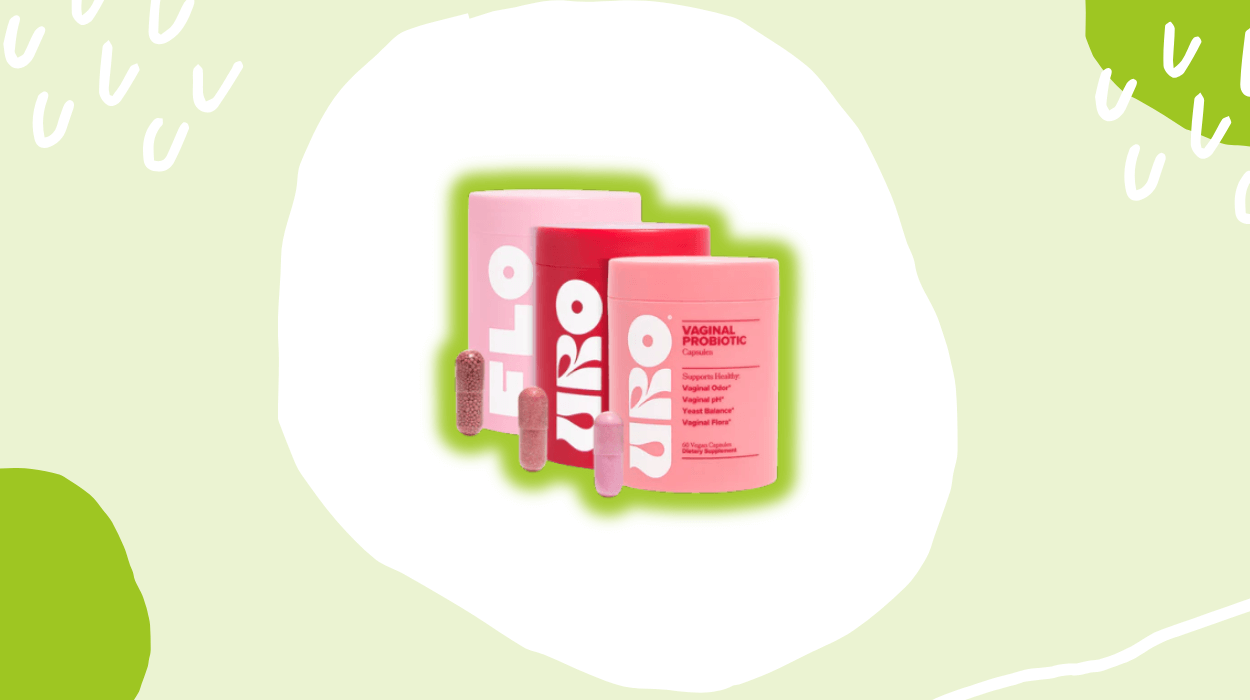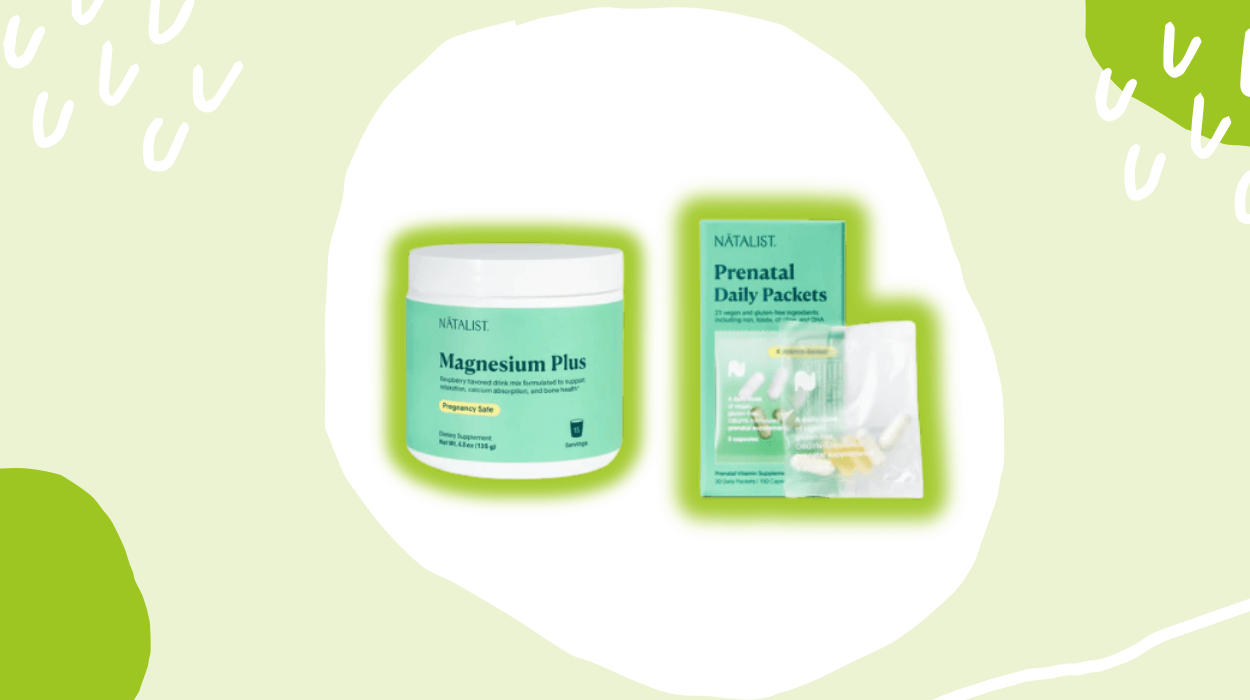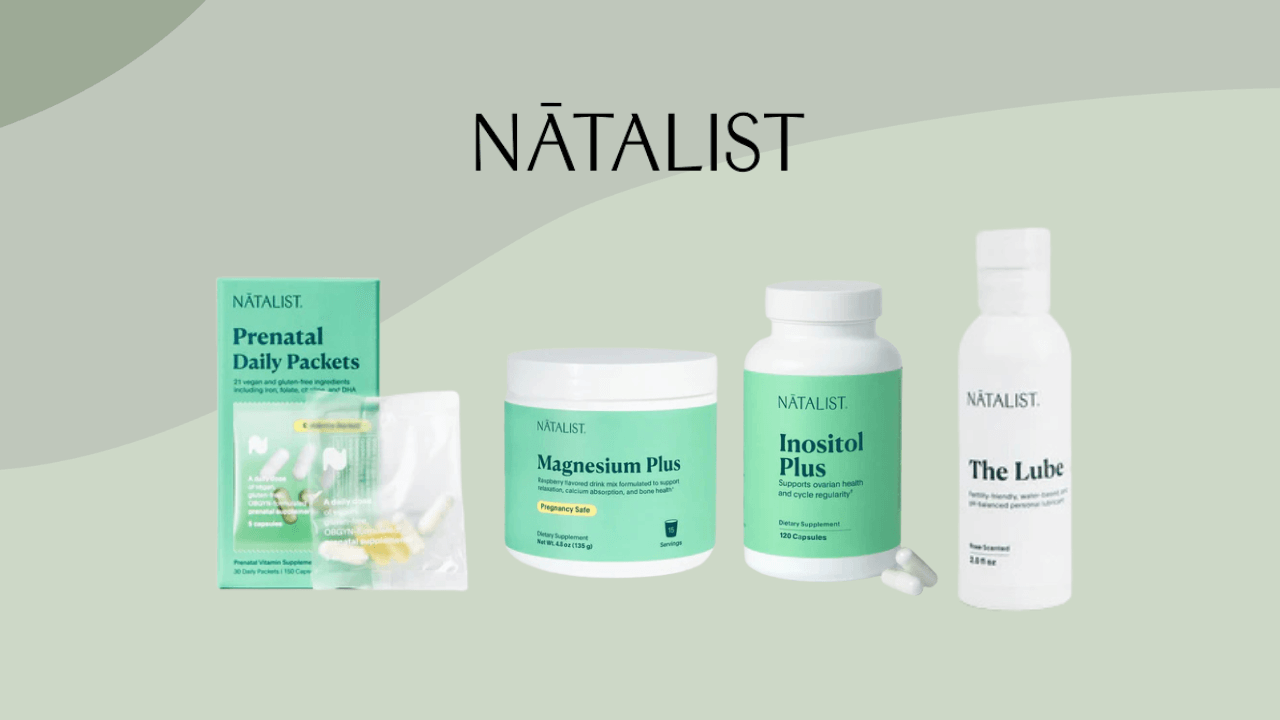

Natalist is focused on providing science-backed products that may support you throughout your fertility, pregnancy, and postpartum journeys.
It offers an extensive range of products, including prenatal vitamins, ovulation and pregnancy tests, fertility lubricants, and self-care items like nausea relief tea and belly oil.
The brand also claims to address common concerns you might face on your reproductive journey, such as supporting fertility naturally, managing pregnancy symptoms, and maintaining well-being during postpartum recovery.
In this review, we will explore the product options offered by Natalist, including the brand’s advantages and limitations. We will also evaluate the brand’s reputation and consumer experiences that could help you make an informed decision.
Natalist is a U.S.-based brand founded in 2019 by Halle Tecco and offers various options to support your reproductive health. The brand focuses on providing formulations that can potentially help address common concerns related to fertility, pregnancy, and postpartum care.
Their supplements include Prenatal Gummies, Inositol Plus, Magnesium Plus, CoQ10 Liquid Capsules, and Male Prenatal Daily Packets. For diagnostic needs, the brand provides tests like Ovulation Test Kits, Early Pregnancy Test Strips, and the Test Strip Pack. Their self-care line includes items such as conception-friendly lubricants.
They also offer male fertility products designed to support their reproductive health, alongside curated bundles such as the TTC Gummy Bundle and Male Preconception Support Bundle.
As per the official website, the brand is certified plastic neutral and actively works to reduce its environmental footprint. They also mention the list of all product ingredients and avoid unnecessary additives.

Prenatal Gummies by Natalist may support fetal brain development by contributing to the synthesis of cell membranes and neurotransmitters such as acetylcholine, which are crucial for cognitive function. It also supports maternal liver health by preventing fat accumulation during pregnancy.
The makers added folate (as Methylfolate) in these gummies to support neural tube development by contributing directly to DNA synthesis and cell division, which are critical during the early stages of fetal development.
As per the official website, DHA (Docosahexaenoic Acid) in Prenatal Gummies could support the development of the fetal brain and retina. DHA integrates into cell membranes, promoting neural growth and cognitive function, and supports eye health, particularly during rapid brain development phases.
The formulation also includes Vitamin B6 (as Pyridoxine HCl) and Vitamin B12 (as Methylcobalamin), which are vital for energy metabolism and neurological function. B6 may aid in neurotransmitter synthesis and help reduce nausea and morning sickness, while B12 might aid in red blood cell production and nervous system function.
Biotin in these gummies may support skin, hair, and nail health by acting as a coenzyme in fatty acid synthesis and energy production, which may be particularly helpful as pregnancy puts increased demand on the body. Iodine is added to support proper thyroid hormone synthesis, which regulates metabolism and supports fetal brain development.
Magnesium Plus is a drink mix by Natalist, which may support relaxation, calcium absorption, and bone health, with a particular focus on safety during pregnancy and breastfeeding. It combines magnesium gluconate, calcium, and vitamin D3.
This drink may help maintain adequate magnesium levels, supporting muscle relaxation and reducing feelings of physical strain. It might regulate blood sugar levels and support a healthy nervous system.
Calcium in Magnesium Plus may help maintain strong bones and teeth, while vitamin D3 (cholecalciferol) enhances calcium absorption in the intestines and may regulate calcium and phosphate levels in the blood.
As per the official site, this product comes in a raspberry-flavored powder form, designed to be mixed with water and provides 15 servings per container.
Natalist claims that its CoQ10 Liquid Capsules provide 120 mg of CoQ10 (Coenzyme Q10) per capsule, which might protect cells from free radical damage and support cellular energy production. CoQ10 is naturally present in the body and is a critical component of the mitochondrial electron transport chain, where it supports the production of adenosine triphosphate (ATP).
CoQ10 helps maintain the energy-intensive processes involved in oocyte (egg) maturation, which can decline with age. It could also help reduce oxidative stress, which can damage DNA and cellular structures in reproductive cells.
Natalist Vitamin D3 Gummies may support your bone health, muscle function, and energy levels. As per the official website, one gummy can provide 1,000 IU (25 mcg) of vitamin D3 (cholecalciferol). Vitamin D3 may promote calcium and phosphate absorption in the intestines, which is essential for the development of stronger bones and healthy teeth.
Inositol Plus may support ovarian and egg health while promoting healthy hormone balance and cycle regularity. It contains 2,000 mg of Myo-Inositol and 50 mg of D-Chiro Inositol, following a 40:1 ratio of these two inositol forms.
Myo-Inositol is a carbocyclic sugar that may support cellular signaling pathways, especially in the ovaries. It acts as a secondary messenger in the insulin signaling pathway, helping cells respond appropriately to insulin.
Myo-Inositol could also support the maturation of oocytes (eggs) and their quality by promoting healthy follicular development.
The makers added D-Chiro Inositol in this formula, which might support hormone balance by modulating insulin sensitivity and contributing to the regulation of steroid hormone synthesis. It may help improve your body’s insulin response, which in turn supports balanced androgen levels. This is important because excess androgens can interfere with regular menstrual cycles and ovulation.
Natalist claims that its Lube is a fertility-friendly, sperm-safe lubricant that can support couples trying to conceive.
The brand claims that their lube could mimic the natural environment of fertile cervical mucus, helping sperm maintain motility and function during intercourse.
Its water-based formula is said to be pH-balanced, isotonic, and viscosity-balanced, reducing the risk of negatively affecting sperm activity or survival.
The Lube includes hydroxyethylcellulose, a plant-derived polymer that provides a smooth, frictionless consistency, allowing a comfortable sexual encounter without impairing sperm motility.
Sodium chloride and phosphate may act as buffers in this formula to help maintain a stable pH similar to the natural vaginal environment, which is critical because sperm require a slightly alkaline environment to remain viable and reach the egg.
Fructose and arabinogalactan are included to create a nourishing medium similar to cervical secretions. They may serve as an energy source for sperm and aid in sperm longevity.
As per the official website, the Lube comes in a convenient 2.0 fl oz bottle and is intended for use during intercourse to create a pleasurable, sperm-friendly environment.
Natalist provides a full-spectrum approach to reproductive health, offering products and resources that support you at every stage of your reproductive journey. Their portfolio covers preconception, conception, and postpartum care, including prenatal vitamins like the Prenatal Gummies, fertility-friendly lubricants designed to support sperm viability, and supplements such as CoQ10 and Myo-Inositol to enhance reproductive health. This integrated approach might help ensure that you have access to both scientifically formulated products and reliable information, enabling a coordinated, informed strategy for reproductive health.
Natalist claims to offer tools to help you understand and track your unique menstrual cycle with precision. The brand features an Ovulation Calculator that estimates your fertile window based on your cycle duration, making it easier to predict ovulation.
It also provides an Ovulation Test Kit, which complements this by providing 30 test strips, a urine cup, and a patent-pending cycle tracker, enabling you to monitor key hormonal signals such as LH and estradiol.
Alongside these tools, Natalist offers guidance on normal versus abnormal ovulation, early ovulation patterns, and effective ways to use ovulation tests for family planning.
Natalist may help you to interpret your body’s signals by combining these tracking tools with actionable educational resources. This personalized cycle tracking can help you make informed decisions, optimize your chances of conception, and feel supported throughout your reproductive health journey.
Natalist does not have a publicly disclosed Scientific Advisory Board (SAB). While the brand claims its products are “science-backed” and “doctor-curated,” the absence of an SAB means there is limited independent evaluation of product formulations and claims. Typically, an SAB provides objective guidance on research, development, and product safety, and its absence reduces external scrutiny and increases the risk of potential conflicts of interest influencing product development or marketing. This limitation can affect confidence in the products. You may need to seek additional information or consult healthcare professionals to verify safety and efficacy. This absence of independent oversight can limit your trust if you are seeking fully verified scientific support.
Ritual and Natalist both operate in the reproductive health space but target different scopes of care.
As per its official website, Ritual is a science-driven brand that emphasizes overall women’s wellness, from preconception to postpartum.
Its product range includes prenatal and postnatal multivitamins, gut health supplements like Synbiotic+, brain and heart support, skin health formulations, relaxation aids such as Magnesium+, and protein supplements.
The brand highlights transparency through traceable ingredients, human clinical studies, and third-party testing, and it publicly features its scientific leadership, including PhDs, registered dietitians, and physicians, which strengthens its credibility.
On the other hand, Natalist concentrates specifically on reproductive health and fertility. Its offerings combine supplements and diagnostic tools designed for each stage of the reproductive journey.
Its product range includes options such as Inositol Plus for ovarian health, Trimester Pack: Prenatal Gummies, Magnesium Plus, and fertility-focused bundles like the TTC Essentials Bundle and Get Pregnant Bundle. Natalist also provides ovulation and early pregnancy test kits, along with books and e-guides for additional guidance.
While it emphasizes evidence-backed formulations and medical advisory input, Natalist does not publicly disclose a Scientific Advisory Board, making its scientific oversight less transparent compared to Ritual.
As per their official website, Ritual’s pricing is moderate and relatively consistent, with individual supplements ranging from $22 for iron to $54 for specialized products like Synbiotic+ (gut health), HyaCera™ (skin support), and Magnesium+ (stress relief). Their bundled sets, which combine multiple supplements, typically range between $75 and $147.
Natalist, on the other hand, has a broader and generally higher pricing range due to its integrated approach to reproductive health. Single supplements like Magnesium Plus and Inositol Plus are priced around $35–$39, while prenatal and male fertility packets range from $66 to $132.
Comprehensive bundles and kits, such as the TTC Essentials Bundle, Get Pregnant Bundle, and Complete TTC Bundle, can reach $180–$244, with stage-specific packs like the Trimester Pack: Prenatal Daily Packets priced around $165–$198. This higher range reflects the addition of supplements, diagnostic tests, and educational resources designed for a full reproductive support experience.
Ritual provides a broader range of wellness products that extend beyond reproductive health to include gut, brain, heart, skin, and relaxation support. Natalist focuses on fertility and reproductive support, combining supplements with diagnostic tools.
Needed and Natalist both focus on supporting fertility, pregnancy, and postpartum health, but they differ significantly in product range, brand philosophy, and approach.
According to its official website, Needed offers a comprehensive selection that extends beyond reproductive health to wellness for both women and men. Its product lineup includes Prenatal Multi Capsules, Egg Quality Support, Prenatal Collagen Protein, Prenatal Omega-3, and combination plans such as the Fertility Support Plan for Two.
Needed emphasizes complete nutritional coverage through stage-specific plans, including trimester-focused support, cognitive health, sleep and stress management, gut health, and lactation, providing an all-in-one approach for perinatal wellness.
On the other hand, Natalist has a more specialized focus on fertility and prenatal care. Its offerings include Inositol Plus, Prenatal Gummies, Magnesium Plus, CoQ10 Liquid Capsules, and male fertility bundles.
Beyond supplements, Natalist provides fertility tracking tools like ovulation test kits, early pregnancy test strips, and sperm-friendly lubricants such as The Lube. Natalist emphasizes science-driven formulations but leans more heavily on user convenience and supporting reproductive health through both products and lifestyle tools. Meanwhile,
Needed offers a broader, more holistic approach to perinatal and general wellness, while Natalist delivers a targeted, fertility-centered experience with supplemental tracking and lifestyle support.
To evaluate Natalist, we considered several factors, including its brand history, mission, product offerings, and customer feedback.
The brand highlights addressing gaps in fertility and pregnancy care with science-backed, transparent, and sustainable products.
We examined the brand’s product range, which includes prenatal vitamins, fertility tests, lubricants, and educational resources. These products are designed to support reproductive health while prioritizing sustainability.
Natalist has a 4.6-star rating on TenereTeam, which is based on 15+ reviews. However, the relatively small number of reviews limits its reliability and makes it difficult to understand the reputation of the brand.
While many people report positive experiences, some mentioned concerns regarding product consistency, pricing, and the early detection accuracy of pregnancy tests. These mixed reviews helped us weigh both the strengths and limitations of the brand.
Our evaluation indicates that Natalist has a wide range of products and also follows sustainable practices, though areas such as product consistency, pricing, and test accuracy may require consideration for prospective users.
When looking at Natalist’s product line in terms of overall value for money, the pricing generally sits in the moderate range, with most products clustering between $20 and $30.
The Prenatal Gummies are priced at about US $39, positioning them close to Ritual’s prenatal multivitamin, which typically falls in the US $35–50 range, while Needed’s prenatal capsule or powder options are higher, often US $60–70+, depending on format.
Natalist’s Magnesium Plus, at about US $35, comes in lower than Ritual’s Magnesium+ mixes, which usually range from US $50–60, and Needed does not offer a direct equivalent in this category.
For CoQ10, Natalist prices its liquid capsules at about US $39, making it more affordable than Needed’s version, which sits in the US $45–50+ range, and substantially below Ritual’s fertility support blends that include CoQ10, which can cost well above US $100 into the US $140+ range when bundled.
Natalist’s Inositol Plus is also around US $39. Needed’s inositol formulations, often included in bundles, range from about US $35–50+, while Ritual’s fertility blends with inositol tend to start higher, commonly in the US $80–100+ range depending on serving size and format.
Vitamin D3 Gummies from Natalist, at about US $27, align closely with simple single-nutrient gummies offered in the broader market, where Ritual or Needed equivalents are less consistently available but would generally range from US $25–40.
The Lube, at about US $25, is unique to Natalist, as Ritual and Needed primarily focus on supplements and do not provide comparable personal care products.
Natalist’s range demonstrates competitive pricing for single-nutrient and targeted support products, often undercutting Ritual’s bundled fertility formulations and Needed’s clinical-grade offerings.
Ritual remains close in cost for its basic prenatal, though its add-ons and bundles push the total higher, while Needed positions itself on the premium end with more robust dosing but higher entry points.
Natalist focuses on supporting your reproductive health through its product range, including prenatal vitamins and fertility supplements. It also offers features like personalized cycle tracking and integrated fertility support to help you take a proactive role in your reproductive health.
However, you should be aware of some limitations. The brand does not have a publicly disclosed Scientific Advisory Board, and while the brand mentions guidance from a board-certified OBGYN and a registered dietitian-nutritionist, their specific credentials are not provided. This limited transparency reduces independent oversight of product formulations and may affect your confidence in their safety and effectiveness.
If you are considering Natalist and its offerings, make sure to review product details carefully, especially if you have existing health issues or allergies. While the brand provides a structured approach to reproductive health, the lack of independent scientific verification is an important factor to consider.
Contact us at [email protected] or follow @leafsnap on Twitter! View our Privacy Policy.